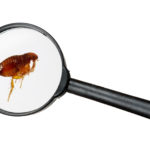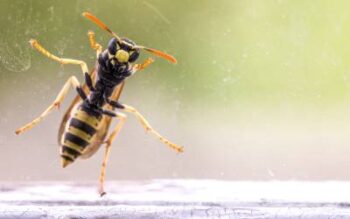The summer weather brings everyone outside, especially pesky insects! There are 891 different types of insects in Tennessee, and possibly more that we don’t know of. As the days get longer and the nights grow warmer, how are you protecting your home from invasive critters?
If the thought of ants, termites, cockroaches, and other insects sends shivers down your spine, don’t worry. We’ve listed some of our top pest control tips so you can protect your home all summer long.
1. Avoid Ants With a Clean Kitchen
You’ve got ants in your pants! No, probably not in your pants. But if you have a messy kitchen full of crumbs, then you’re going to attract an entire colony of ants.
After a meal, clean up your dishes. Leftover food and dirty dishes are a hungry ant’s dream. While you might not want to, washing dirty dishes immediately after you’re finished with them goes a long in preventing household ants.
Ants are also attracted to sweet and sticky substances. That means your summertime sweet tea and popsicle juice needs to get wiped up as soon as possible. During the summer months, which are when ants are most prevalent, wipe down your counter a few times a day. If there’s no sticky residue, there won’t be any ants.
Finally, store open food in sealed and air-tight containers. Don’t leave snacks on your countertop. Ants have four to five times more odor receptors than other insects, which means they can smell open food from far away.
If you’re already noticing ants in your house, don’t panic. Household remedies using lemon juice, vinegar, cinnamon, and mint can keep ants away. If your ant problem continues to escalate, don’t be afraid to contact the professionals.
2. Eliminate Food Sources for Cockroaches
Those warm summer winds come at a price. Cockroaches emerge during the summer months in Tennessee and can find their way into your home.
Adult cockroaches may grow up to three inches long. They have a reddish-brown or mahogany color. When the weather gets hot or rainy, cockroaches wiggle their way into our homes.
Cockroaches aren’t picky when it comes to their dinner. The insects will eat anything from leaves and fungi to unsealed pet food.
Aside from being household pests, cockroaches can carry bacteria, warms, and pathogens that are harmful to people. Large numbers of cockroaches may aggravate allergies and asthma.
Keep the roaches away this summer by increasing your home’s hygiene. Similar to keeping ants out of your house, you can reduce your risk of cockroaches by keeping a clean kitchen and storing open food in sealed containers.
Throughout the summer months, frequently empty your trash. Cockroaches are drawn to rotting food and debris. Empty your trash every night before bed. Use a tight-fitting lid during the day.
Since roaches feed at night, give your kitchen and eating areas a quick sweep before heading to bed to eliminate food sources. Vacuum your home every two to three days to get rid of roach feces and egg sacs.
Don’t leave paper or cardboard laying around your house. Cockroaches will gravitate towards them and use the materials for shelter.
Keep in mind that if you have a problem with cockroaches this summer, there are local experts who can help.
3. Tidy up to Avoid Ticks
There’s nothing quite like freshly cut grass in the summer. But maintaining your yard does more than enhance your curb appeal. Keeping your landscaping under control prevents overgrowth, which leads to fewer ticks around your house.
In Tennessee, there are 15 different species of ticks. The most common types are black-legged ticks (also known as deer ticks), brown dog ticks, and American dog ticks (also referred to as wood ticks).
Ticks are more than a simple pest. They carry dangerous diseases that severely impact our health. American dog ticks spread Rocky Mountain spotted fever and are most likely to infect people during spring and summer months. The deer tick carries Lyme disease, a chronic medical condition with no cure.
Ticks lurk in grass, trees, and leaves. To reduce the number of ticks in your backyard, regularly mow your lawn. Eliminating tall grass and brush destroy ticks’ hangout spots.
You can also prevent ticks from crossing onto your property by lining your backyard with wood chips or gravel. Ticks don’t like walking over these substances and will stick to the woods.
4. Cover Your Cracks to Prevent House Centipedes
House centipedes are arthropods, not insects. They range from three to six centimeters in length. House centipedes usually look gray or brown, but sometimes they have purple or blue stripes.
Centipedes are predators that hunt flies, cockroaches, moths, and spiders. They prey on their victims at all times, day and night.
To keep centipedes out, you must understand how they enter your home. Centipedes typically enter a home through open windows and cracks. You are most likely to encounter a house centipede lurking in your basement, shed, bathroom, or within the walls of your home.
This summer, prevent centipedes from entering your house. Check your pipes, especially in your bathroom. Leaking taps lead to high humidity and moisture, which create a perfect habitat for a centipede.
Reducing the number of insects in your home will decrease your chance of attracting centipedes. Remove old dry leaves and twigs from your garden. Discard paper, rotten wood, or debris in your basement or close to your house. These items attract insects that centipedes prey on.
Install mosquito nets around your windows and vents to prevent centipedes from slipping into your home. Fill open cracks that create an entry point for tiny critters to crawl through.
5. Take Away Termites’ Food Source
Termites are a serious concern for Tenessee homeowners. Every year, these insects cause billions of dollars of structural damage to properties.
Subterranean termites cause the most damage throughout Tennessee. The insects feed on wood. They have protozoa and bacteria in their guts that break down wood fibers, which most insects cannot do.
Termites dwell in soil under and around homes. They enter homes by constructing mud tubes from the ground that connects with wood. Sometimes termites will enter a home through concrete walls or your home’s foundation.
During the summer, the best way to prevent a termite infestation is by properly storing firewood. After a long winter, move firewood as far away from your house or shed as possible. Homeowners should keep firewood at least five feet away from their houses.
When you store your firewood, use a rack to keep the logs above the ground. This lowers your risk of termites getting to the wood.
6. Remove Stagnant Water to Stop Mosquitoes
It’s not a Tennessee summer if you don’t have at least one mosquito bite! While mosquitoes are most common during the warmer months, their eggs can hatch anytime the weather rises above 50 degrees Fahrenheit. Sometimes, mosquito season lasts from the end of March through mid-October.
Mosquitoes thrive in humidity, still water, and shaded areas. While humidity and shade might be out of your control, you can eliminate stagnant water to prevent large groups of mosquitoes around your house.
Walk around your property and look for stagnant water. This is where mosquitoes breed. There isn’t a body of water too small. Any form of still water attracts mosquitos.
Drain your gutters regularly throughout the summer. Change the water in your birdbaths. Cover your trashcans to prevent moisture buildup. Empty any buckets laying our your property.
Some homeowners also rely on plants to naturally repel mosquitoes. Their fragrances scare away mosquitoes and stop them from entering an area. Marigold, Lavender, Rosemary, and Catnip are all plants that keep the mosquitoes away.
7. Keep the Mouse out of Your House
Mice are some of the most common household pests Tennessee residents encounter. In the summer, mice reproduce quickly, so the number of rodents multiplies quickly.
Before you open your home up for the summer, make sure everything is properly covered. This includes vents, chimneys, doors, and windows. Do not open a door or window without a screen.
Mice gravitate towards dark spaces where it’s easy for them to hide. Check your basement, shed, and attic for mice droppings. If you find any, search for any cracks or holes. By covering the entry point, you will stop mice from re-entering your home.
If you find a large number of mouse feces, you may already have an infestation. Don’t panic. Call a local rodent control team to assist you.
Mice also love moisture and often reproduce in wet areas. Running a humidifier during wet summer months keeps basements and crawl spaces dry. Check and repair any leaking pipes or clogged drains that create a breeding ground for mice.
Finally, keep your yard and home clean. Outdoor BBQs are great in the summer, but after the party, make sure all trash and leftover food are cleaned up. Mice are opportunist eaters and will munch on anything humans leave behind.
Pest Control Tips From Your Local Pest Experts
With our pest control tips, you can keep ants, termites, cockroaches, and other pesky critters away this summer. But if preventative measures fail, it’s essential to contact a reliable pest control team.
Inman-Murphy offers advanced termite and pest control services. From ants to rodents to mosquitos, we’ve got you covered. Contact our team to learn more about our pest control treatments.




